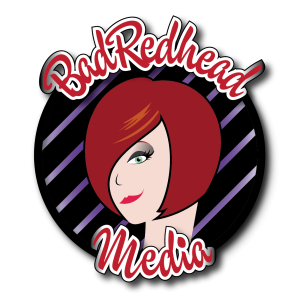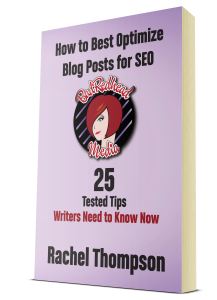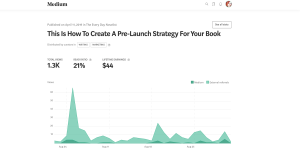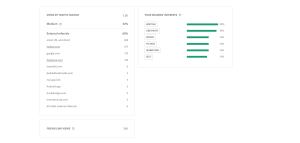How Blogging Consistently Helps Readers Find You
In a recent #BookMarketingChat on Twitter, I discussed why writers need to embrace blogging consistently. This frequently causes much opposition from writers who say they’re too busy writing to blog, which I completely understand. Time is and always will be an issue.
However, that’s a front. Time isn’t the issue. It’s focus.
Many writers aren’t sure what their branding is, so they flail about for blog topics, unsure what to write about, so, they don’t. It’s easier to not do something than it is to do it. I’ve already addressed four ways to make time to blog in this article, so today I’m going to help you understand just how crucial blogging is to your author platform = how readers will find you.
How Blogging Equals Visibility on Google
There are several reasons to blog. Let’s review.
- Fresh content. Blogging keeps your website fresh and current. Google doesn’t want to deliver its searchers outdated information. Websites that are regularly updated signal to them that the website is alive and offering fresh content.
- Indexing your site more often and over time. It also gives the search engine algorithms more reason to index your website more often keeping it more on their radar over time. You’re probably not going to have reason to update your homepage frequently (and it wouldn’t necessarily be a good business move to do so), so a blog is a more practical tool for adding new content to your website on a regular basis. (Source: Hostgator)
- Social media. Social is ‘rented land’ so to speak, yet still important. The half-life of any social media post is minimal, yet your blog posts are permanent. YouTube, Twitter, Facebook Pages (no official word if Instagram is included), and LinkedIn are the only known ranking factors (out of the top 200) as of this writing so keep in mind that if you’re spending all your time on social and none blogging, that’s an informed choice you are making to not make a more permanent mark online. Why?
Crucial Blogging Factors
Once you start blogging regularly, you need to learn how to format your blog posts correctly. I had no idea what this even meant. Couldn’t I just write whatever I wanted and hit publish and be done? Let’s face it, most writers are lazy. We want to just write. Technical stuff makes us want to climb out of our skin. Yet, writing is only one part of publishing, whether that’s a blog post, a tweet, or a book.
Learning how to optimize (more below) your blog posts isn’t rocket science – however, it’s a skill that will serve you well. What do you need to consider?
- Keywords/keyphrases. When you pick a main theme for your blog post, e.g., for this post it’s blogging, you want to be sure that you use it in the title, the permalink, the headings, the metadata (aka, the description that will show up on Google, Facebook, and other places you share it), the photos, the featured image, etc. Why? So this post will rank on Google for this keyword. Sure, there are millions of blogging posts out there, so it’s important I consistently post about this topic (see Bullet Point #2 above). Part of my branding is that I’m known for writing about blogging and I consistently post about it often and over time.
- Content length. Longer posts fair better on Google. I know, I know. This is a key sticking point for many writers who want to throw a photo up there, write a paragraph, and call it a day. Well, a blog is not a Facebook post, so get over it. Once you determine your branding keywords/keyphrases so you know your focus, and you’ve accepted that you need to blog regularly to connect with readers who want to buy your books, you’ll get it. You’ll do it. Google does look at quality content.If you’re writing stream of consciousness blather which makes no sense, you won’t rank.SEO researchers have found that long-form blog posts tend to perform better than shorter ones – the average first-page result on Google is nearly 2,000 words long.
- Quality of content. Google ranks your site as trustworthy and authoritative based not only on what you write but also the quality of your links. Quote your sources. Link both internally and externally. A blog keeps people on your website for longer. Google’s number one priority is providing the people performing searches with the information they’re looking for, so they’ll keep coming back to use Google again. If they recommend your blog in a search, it’s because it’s great. So, make it great.
I know you want to build relationships with readers and may be at a loss to do so. Spamming links on Twitter is the least effective way to do that (and against their Terms of Service), yet that’s what many writers resort to. The conversion rate of Tweet to sale is less than 1%, whereas the average conversion rate for blog posts is anywhere from 2% to 12% (Source: Invesp.com)
I do hear from many writers who have immune disorders or deal with daily pain who tell me that writing blog posts regularly is impossible for them. As someone who deals with chronic pain, I relate.
My advice, take it or leave it, is to start with one or two blog posts a month. Write 10 minutes a day on your blog post. That’s all. After two weeks, that’s enough to write, optimize, and publish.
Why Blog Optimization Matters
Let’s get into optimization. It’s a big, scary word until you understand how much it helps you connect with readers. The bright, big light goes off and you’ll say to yourself, “Self. Why TF didn’t I do this before?” Yea, it’s more work. So what? Do it.
Optimization means all the behind-the-scenes stuff you need to do to format your post to make it Google-friendly, like choosing the appropriate tags, categories, keywords, featured image, metadata, adding internal and external links, a headline that’s high-ranking (I recommend using the free CoSchedule Headline Analyzer), etc.
How do you learn? Well, I’ve made it incredibly easy for you – I’ve put my 25-point process into a 99¢ guide you can download here.
If you don’t want to spend a buck, that’s cool. You can research blog optimization options on Google, on whatever platform you’re using (e.g, WordPress, Wix, Weebly, SquareSpace, Blogger, etc.). All will give you information on their specifics. Or look it up on YouTube. Whatever is easiest for you, do it.
Just do it.
Always only 99¢
Other Blogging Options
I’ve recently started writing actively on Medium as part of their Partner program, which means I can earn money for my posts. Several of my posts have been ‘curated’ by Medium, which means they show up on the front pages of several top categories like Writing, Marketing, Mental Health, Relationships, etc. Being curated is a big deal because your visibility shoots way up and you have the potential to make more money.
Here are screenshots from one of my most-viewed posts, This Is How To Create A Pre-Launch Strategy For Your Book. I’ve made $44 so far this month. As you can see, Twitter, Facebook, and email (I sent out an email about it) are the most significant sources of traffic, even though it was curated:
I hear many writers in the various Facebook Medium groups I belong to discussing how angry they are that Medium isn’t curating their posts.
Like anything that doesn’t belong to us, Medium is rented land.
Depending on other people to ‘clap’ (that’s how you show you appreciate a post – give it up to 50 claps and make that writer happy), share, and comment, or on Medium to curate our posts to make money is an iffy situation at best.
Many of these writers aren’t participating in #MondayBlogs, they don’t create Twitter threads or moments to tease out their posts, or send out their new posts in email newsletters (if you do this, I also recommend sharing other people’s Medium posts that resonate on your keywords if you do this, so it’s not all about you).
On the flip side, there are a handful of writers making bank on Medium. I know a few. Shaunta Grimes is one (follow her and read her – every word is gold). How does she do it? She writes several quality posts per day. She emails each post to her subscriber list of almost 20K people. She shares it with her Ninja Writers group on Facebook (over 18K people).
Some folks also blog on Facebook (in Notes) or on LinkedIn. I believe these are good options in addition to blogging on your own site.
Blogging Connects You With Readers
The most important point of all: connecting with readers. As I mentioned above, social media is great – to a point. It’s wonderful for building relationships and visibility, however, it’s still rented land. We are at the mercy of whatever terms of service they dictate, new designs (Twitter’s new design – love or hate it?), Instagram’s ever-changing likes and algorithm changes, and don’t even get me started on Facebook.
If you’re mad at Facebook for its practices, leave. If you’re uncomfortable with the formatting on Twitter or that you can’t edit a tweet, don’t use it. If you don’t like using Instagram because you can’t put a live link in your post (without paying for it), that’s on you for using them.
Social media can only accomplish so much with regard to SEO, as mentioned above with regard to the Google ranking factors. I work with many high-level authors (e.g., New York Times bestsellers) and those who blog regularly significantly rank higher for their keywords in Google. Their fans flock to their blog posts to comment whenever they post, and their social media is hoppin’.
The key in all of this? Be generous. Share others’ posts. Comment on them. Participate in blog sharing memes like #MondayBlogs (share blog posts on Mondays. Not books or book promotion. Use another hashtag for that.)
Embrace blogging. Writers write. Make it count.
Write your posts. Optimize them. Share them. Generously share others. Repeat.
For a more detailed plan on developing your book marketing, purchase Rachel’s new book,
The BadRedhead Media 30-Day Book Marketing Challenge
Now on Amazon!
Readers’ Favorite Silver Award Winner!
The BRHM Mailing List
Sign up for the BadRedhead Media newsletter and receive 10 Blogging Basics For Every Author!






This is a great summary of how to go about creating content for your blog that actually helps you build and grow an audience. Important point is to always focus on the audience you are trying to reach when creating content. Entertain them, educate them, inform them, answer their questions, make their lives just a little bit better…
Thanks so much, Marko! So glad you found it helpful. Appreciate you reading and commenting.
I see precisely how this works for non fiction. I am having trouble getting my head around blog topics for fiction writers. There are too too many writers writing about writing already. Can you give lots and lots of examples of successful fiction writer blog topics? I keep thinking maybe I just put up free written content. Good idea or bad?
Hi Cathy – if you click on the article where I mention author branding, you’ll get an idea of how blogging works for any author. Short answer: we brand the author, not the book (or not ONLY the book). Doesn’t matter if you write fiction or non-fiction.
What are the main topics that fascinate you? What do you wish people knew more about? Are you an expert on a certain subject? Are you not an expert but want to be? Why?
Make lists. Keep it handy. Then write about that stuff!
One of the biggest mistakes I see writers make is writing about writing. Zzzzzzz. Unless your demographic is writers, you’re barking up the wrong tree.
You are a three-dimensional person. Write about what interests you. If writing interests you, fine (I mean, it should, right? We’re writers.). Yet, surely there is more to you than one thing that makes up your life.
Barbara Delinsky is a great example. She writes about writing only very occasionally (and she’s written 22 NYTimes bestsellers!). More here: https://medium.com/the-1000-day-mfa/https-medium-com-rachelintheoc-4-ways-you-can-make-time-to-blog-right-now-8017a12a0fd1?source=friends_link&sk=7046d7d5f510c32e1f63359f4ff6724b
Hope this helps you!
Great answer Rachel… I’ve weaved in a little bit of both, my writing and what I like. I reach more readers blogging about what I like.
#grateful for you!
Ms. Zipporah
[…] Connection with your readers online is important. Elna Cain shares 9 powerful Instagram tools to boost your social media presence, Jordan Peters asks if you are creative enough in your blogging, Christian Mihai has tips for blogging for busy people, and Rachel Thompson explains how blogging consistently helps readers find you. […]
Good to see you’ve had such a positive experience so far on Medium: I’ve been curious about that platform.
I’m not totally convinced a writer should blog if they absolutely hate that format as a way of connecting with readers… But of course I agree that author websites should be kept fresh and offer ways of engaging.
Thanks Rachel. This information is priceless. I’m so grateful people like you ~ those willing to share and help others. This will be so helpful for my first novel.
I agree with Marko, you’re making lives better. I appreciate you more than you know.
Ms. Zipporah!
This is a good one. Thanks for the information.